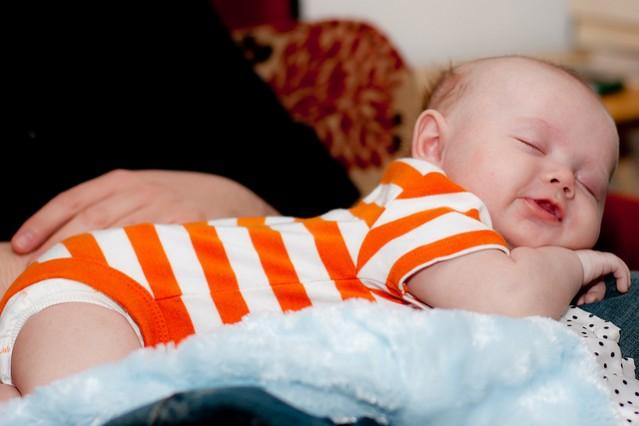
Insufficient sleep in infancy increases risk of obesity later, researchers reveal.
In the study, experiencing chronic sleep deprivation in the early stages of growth was associated with an increased risk of putting on unnecessary weight and fat by age seven.
New-born babies spend most of their time sleeping. Getting proper sleep at the early stages of growth is crucial for both mental and physical development of the baby. Though babies sleep between 10 and 18 hours first few months after birth, by sixth month, the hours will get reduced to nine to 12 at night and short naps (lasting 30 minutes to 2 hours) – one to four times daily, according to National Sleep Foundation.
During the study, researchers Elsie M. Taveras and colleagues studied sleep habits of nearly 1,046 children as a part of the "Project Viva." Mothers were asked to record the total sleeping time of their children at different stages of growth, starting from six-months to age seven. Researchers noted down height, weight and fat of the children at regular basis.
Reduced sleep at infancy was directly linked to obesity and abdominal fat at school age. Though the study couldn't underline the exact facts that led to this occurrence, researchers doubted several factors including the influence of sleep on hunger and satiety hormones, playing a major role in this occurrence.
"Our study found convincing evidence that getting less than recommended amounts of sleep across early childhood is an independent and strong risk factor for obesity and adiposity," lead author of the study, Taveras, said in a news release. "Contrary to some published studies, we did not find a particular 'critical period' for the influence of sleep duration on weight gain. Instead, insufficient sleep at any time in early childhood had adverse effects."
The study has been published in the journal Pediatrics.
There exists enough evidence to prove the link between sleep deprivation and obesity. Last year, Chantelle Hart and colleagues from the Temple University, found that poor sleep at childhood left a negative impact on eating habits. Children who slept more ate less and achieved a straight reduction of about 134 calories per day compared to the days they slept less. Levels of the hormone, leptin, that regulates hunger also went down when the children slept properly.
Another study published in the Nutrition Journal, UK in 2013 reported poor sleep bringing similar effects in teenagers.

















